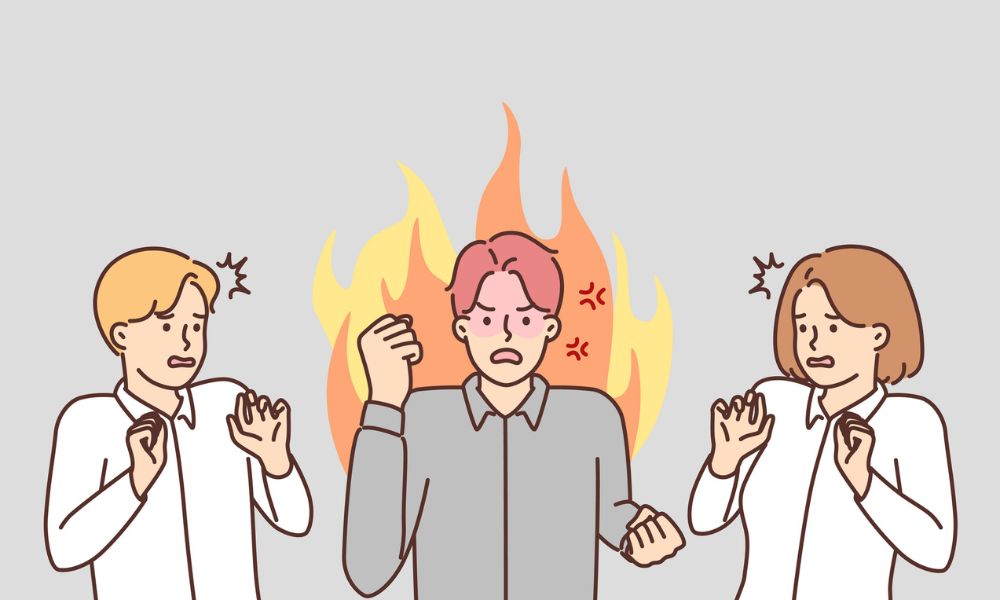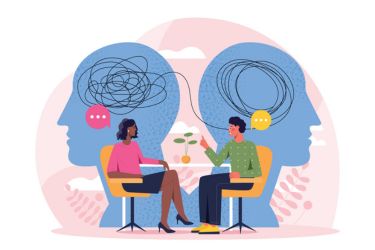Anger is a natural emotion, but it can have serious effects on our relationships if not managed properly. Understanding how anger impacts our interactions can help us build stronger connections with our loved ones. When anger goes unchecked, it can lead to communication breakdowns, resentment, and distance in our relationships. Recognising these patterns early is crucial for maintaining healthy connections.

By identifying our triggers, we can develop strategies to manage our anger effectively. When we learn to handle our emotions, we can prevent negative outcomes such as emotional or physical disconnection from our partners. It's essential to prioritise both our emotional wellbeing and the health of our relationships.
Throughout this article, we will explore practical steps for addressing anger and improving our connections with others. We will discuss various strategies that can empower us to replace anger with understanding and compassion, ultimately leading to more fulfilling relationships.
Key Takeaways
- Recognising how anger affects us is vital for relationship health.
- Effective anger management can improve communication and trust.
- Seeking professional help can provide tailored strategies for lasting change.
Understanding Anger in Relationships

Anger is a natural emotion that can have significant effects on our relationships. It’s important for us to grasp the psychology behind this feeling and the ways we can manage it effectively to maintain healthy interactions.
The Psychology Behind Anger
Anger often signals deeper issues within our relationships. It may arise from feelings of hurt, frustration, or unmet needs. When we experience anger, it's a reaction to something that feels unjust or threatening to us.
In many cases, anger is a response to disconnection. For example, we might react with anger when our partner does not listen to us, as it reflects a lack of understanding. This emotion can create barriers, making us feel isolated. On the flip side, when expressed appropriately, anger can highlight issues that need addressing, helping to restore intimacy and connection.
Emotion Regulation and Its Importance
Managing our anger is crucial for maintaining mental health and healthy relationships. Emotion regulation is our ability to control how we express and experience feelings. Poor emotion regulation can lead to outbursts, causing strain on our relationships.
We can improve our emotion regulation by practising self-awareness and mindfulness. Recognising early signs of anger allows us to pause and choose our reactions. Techniques like deep breathing or stepping back from a heated situation can prevent destructive outcomes. When we handle anger well, we open pathways for constructive communication, which ultimately strengthens our relationships.
Identifying Anger and Its Triggers

Understanding our anger responses is crucial for managing how we interact in relationships. By recognising the signs and identifying specific triggers, we can take meaningful steps to express anger more constructively.
Recognising Anger Responses
Anger can manifest in various ways. We might experience physical signs like a racing heart, clenched fists, or tense muscles. Our emotions may swing from irritation to frustration, ultimately leading to outbursts. It's essential to check in with ourselves to notice these changes.
We can also express anger verbally, sometimes through raised voices or harsh words. Being aware of these patterns allows us to pause and change direction. Taking a moment to breathe can help us respond in a calmer, more thoughtful manner. Keeping track of these signs is the first step toward better anger management.
Common Triggers of Anger in Relationships
Several common triggers can lead to anger in our relationships. Understanding these can help us navigate our feelings more effectively. Some frequent triggers include:
- Miscommunication: Misunderstandings can easily lead to frustration. We must ensure we communicate our feelings clearly.
- Unmet Expectations: When our needs aren’t met, irritability can build. Focusing on clear expectations can ease tension.
- Stress Factors: External stress from work or life can spill over into our interactions, making us more prone to anger.
Recognising these triggers enables us to plan ways to cope with them. This preparation can help us express our feelings without damaging our relationships. By focusing on specific triggers, we gain the ability to react more positively.
The Impact of Anger on Relationships

Anger can significantly disrupt our relationships, affecting how we communicate and our overall satisfaction with each other. It can create misunderstandings and lead to deeper social problems if left unchecked.
Communication Breakdown and Conflict
When anger arises, it often leads to a breakdown in communication. We may become defensive or shut down entirely, making it hard to express our feelings clearly. This can escalate conflicts, as we focus on proving our point rather than seeking resolution.
Consequently, angry exchanges can foster resentment. Over time, patterns of anger can create walls between partners, making it harder to connect. We might find ourselves avoiding certain topics to keep the peace, but this only prolongs unresolved issues.
It's crucial to develop good communication skills during these moments. Active listening and expressing our feelings calmly can help reduce tensions. We must remember that fighting fair keeps our relationships healthier.
Effects on Marital Satisfaction and Social Dynamics
Anger also affects marital satisfaction. Frequent arguments driven by anger can lead to decreased happiness in a relationship. Partners may feel isolated or neglected, as anger can overshadow positive interactions.
In social settings, our anger can have a ripple effect. Friends and family may feel uncomfortable or take sides during conflicts, leading to strained relationships outside of the couple. This can further isolate us, creating social problems and impacting our broader support network.
Addressing anger early is vital. Effective anger management strategies, such as taking a break to cool down, can help maintain marital satisfaction and improve our social dynamics. By recognising anger's impact, we can foster healthier connections with those we love.
Health Risks Associated With Unmanaged Anger

Unmanaged anger can lead to serious health risks that affect both our physical and mental well-being. Recognising these risks is essential for taking steps towards better health and healthier relationships.
Physical Health Concerns
Chronic anger can have a direct impact on our physical health. When we experience anger, our bodies produce stress hormones like adrenaline and cortisol. Over time, elevated levels of these hormones can increase blood pressure, leading to cardiovascular issues.
Additionally, unmanaged anger can contribute to problems such as digestive disorders. The stress response triggered by anger can affect our body’s ability to function properly. Frequent anger may also lead to headaches and fatigue, compounding health issues further.
Ultimately, the more we let anger take control, the greater our risk of developing serious health problems.
Mental Health and Emotional Well-being
On the mental health front, unmanaged anger is linked to various issues, including anxiety disorders and depression. Constant anger can block our ability to feel other emotions, making it difficult to express ourselves healthily.
When anger becomes our primary emotion, we may experience feelings of isolation, frustration, and low self-esteem. This unchecked anger can lead to frequent arguments and strained relationships with those we care about.
Moreover, the cycle of unresolved anger and negative emotions can leave us feeling trapped and overwhelmed. It is crucial to address these feelings and seek healthier ways to manage our emotions to safeguard our mental health.
Strategies for Managing Anger in Relationships
Managing anger within our relationships is crucial for maintaining healthy connections. We can adopt specific strategies to help us cope with our emotions and communicate more effectively. Below, we explore coping mechanisms and techniques, along with the importance of effective communication and empathy.
Coping Mechanisms and Techniques
We can use various coping strategies to manage our anger in relationships. Firstly, deep breathing is a simple yet effective technique. Taking slow, deep breaths helps to calm our physiological response to anger.
Next, we might consider physical activity. Exercise is a great way to release built-up tension and stress. Even a short walk can clear our minds and improve our mood.
Additionally, employing mindfulness practices allows us to observe our feelings without judgement. This helps us understand triggers and respond thoughtfully instead of reacting impulsively.
Keeping a journal can also be beneficial. Writing down our thoughts and feelings can provide clarity and perspective on the situations that upset us.
Effective Communication and Empathy
Developing strong communication skills is essential for reducing conflict. We should focus on expressing our feelings calmly and clearly, using “I” statements. For example, “I feel frustrated when…” instead of blaming others.
It is vital to listen actively. By giving our partner full attention when they speak, we show we value their perspective. Practising empathy helps us understand their feelings and motivations, which can reduce misunderstandings.
We can set aside time for open discussions about our emotions. This proactive approach allows us to address issues before they escalate.
Incorporating these strategies can lead to healthier interactions and stronger relationships. By managing anger and fostering empathy, we create a safe space for our emotions and those of our partners.
Seeking Professional Help and Therapy Options
When dealing with anger in relationships, seeking professional help can offer valuable tools and insights. We have various therapy options available that can address anger issues effectively.
Counselling Services
Counselling services provide a supportive space for us to explore our feelings. A trained counsellor guides us in understanding the root causes of our anger and helps us to develop healthier coping mechanisms.
Counselling can be short-term or long-term, depending on our needs. It may involve individual sessions or couples therapy if anger affects our relationships. The focus is on improving communication and emotional expression.
Finding a qualified counsellor is important. We should look for someone registered with a professional organisation to ensure quality care. Many services offer sliding scale fees, making counselling more accessible.
Anger Management Therapy
Anger management therapy focuses specifically on controlling anger and preventing outbursts. In this setting, we learn techniques to identify triggers and respond calmly.
Cognitive behavioural therapy (CBT) is a common approach used in anger management. It helps us understand how our thoughts influence our feelings and actions. By changing negative thought patterns, we can manage our responses to anger more effectively.
Group therapy is another option, where we can share experiences and learn from others. This support helps us realise we are not alone in our struggles. Many resources are available, including online programs and local support groups, which provide flexibility and accessibility.
Creating a Long-Term Plan for Anger Control
Establishing a long-term plan for anger control is essential for fostering healthier relationships. By focusing on building strong habits and reducing stress, we can improve our coping strategies and encourage personal growth.
Building Healthy Relationship Habits
To manage anger effectively in our relationships, we should focus on creating healthy communication habits. This involves expressing our feelings clearly and respectfully. We can practice active listening, which helps us understand each other better and reduces misunderstandings.
We can also use "I" statements, such as "I feel frustrated when..." to communicate our emotions without blaming others. Setting aside dedicated time to discuss challenging topics can prevent anger from building up.
Regular check-ins with our partners can be useful. This creates a safe space for sharing feelings and ensures we address any issues before they escalate.
Stress Reduction and Personal Growth
Reducing our stress levels is vital to controlling anger. Incorporating regular physical activities, like walking or yoga, can help us manage tension and improve our mood. Engaging in relaxation techniques, such as deep breathing or meditation, can also be effective.
We should also consider pursuing personal growth opportunities. Attending workshops or reading books on anger management can provide us with new coping strategies. These practices not only help us manage our anger but also support overall emotional well-being.
By focusing on stress reduction and personal growth, we can establish a more balanced approach to handling anger in our relationships.
Conclusion
Anger is a natural emotion that we all experience. When it affects our relationships, it can create misunderstandings and distance between us and those we care about.
It's important to recognise when anger arises. We can learn to pause, take a breath, and assess the situation before responding. This helps in managing our emotions effectively.
We may consider these strategies to handle anger:
- Communicate: Openly discussing our feelings can prevent misunderstandings.
- Listen: Taking time to hear the other person's perspective can build understanding.
- Reflect: We should ask ourselves what triggers our anger and why it matters.
Seeking support can also be beneficial. Talking to friends or professionals can provide new insights and coping strategies. Resources like HelpGuide offer helpful information on managing anger.
Ultimately, managing anger leads to healthier relationships. By acknowledging our feelings and using practical strategies, we can improve our connections with others. It’s about fostering respect and understanding, which are key components of strong relationships.
Frequently Asked Questions
Anger can have significant effects on our relationships. Understanding these impacts and learning how to manage anger can help us foster healthier connections. Here, we will address common questions about anger and its influence on our personal relationships.
What are the impacts of anger on a marriage or partnership?
Anger can create distance between partners. Frequent negative expressions of anger may lead to resentment and misunderstandings. This can damage trust and intimacy, making it hard to resolve conflicts.
What strategies can help in managing anger within a relationship?
We can use several strategies to manage anger effectively. Techniques like deep breathing or taking a break allow us to cool down before discussing issues. Open communication can also help us express our feelings in a constructive way.
How can one prevent anger from damaging their personal connections?
Preventing anger from causing harm requires awareness and proactive measures. We should actively listen to our partners and validate their feelings. Setting boundaries and knowing when to walk away from heated moments can also be beneficial.
What effective techniques are available for dealing with anger in a confrontational scenario?
In confrontational situations, we can use specific techniques to manage our anger. Staying calm and using "I" statements can help us express our feelings without placing blame. It’s also useful to focus on finding solutions rather than dwelling on problems.
Can frequent outbursts of anger indicate underlying issues in a relationship?
Yes, frequent outbursts often signal deeper issues. These might include unmet needs, unresolved conflicts, or feelings of neglect. Recognising these patterns can help us address problems before they escalate further.
How does one engage with a partner who regularly expresses anger?
When engaging with a partner who is often angry, patience and empathy are key. We should aim to listen actively and avoid reacting defensively. Encouraging open discussions about their feelings can lead to a better understanding of the root causes of their anger.





















